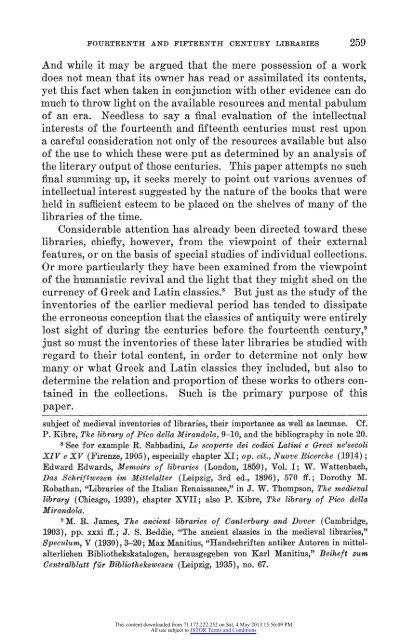The Intellectual Interests Reflected in Libraries of the Fourteenth and ...
The Intellectual Interests Reflected in Libraries of the Fourteenth and ...
The Intellectual Interests Reflected in Libraries of the Fourteenth and ...
Create successful ePaper yourself
Turn your PDF publications into a flip-book with our unique Google optimized e-Paper software.
FOURTEENTH AND FIFTEENTH CENTURY LIBRARIES 259<br />
And while it may be argued that <strong>the</strong> mere possession <strong>of</strong> a work<br />
does not mean that its owner has read or assimilated its contents,<br />
yet this fact when taken <strong>in</strong> conjunction with o<strong>the</strong>r evidence can do<br />
much to throw light on <strong>the</strong> available resources <strong>and</strong> mental pabulum<br />
<strong>of</strong> an era. Needless to say a f<strong>in</strong>al evaluation <strong>of</strong> <strong>the</strong> <strong>in</strong>tellectual<br />
<strong>in</strong>terests <strong>of</strong> <strong>the</strong> fourteenth <strong>and</strong> fifteenth centuries must rest upon<br />
a careful consideration not only <strong>of</strong> <strong>the</strong> resources available but also<br />
<strong>of</strong> <strong>the</strong> use to which <strong>the</strong>se were put as determ<strong>in</strong>ed by an analysis <strong>of</strong><br />
<strong>the</strong> literary output <strong>of</strong> those centuries. This paper attempts no such<br />
f<strong>in</strong>al summ<strong>in</strong>g up, it seeks merely to po<strong>in</strong>t out various avenues <strong>of</strong><br />
<strong>in</strong>tellectual <strong>in</strong>terest suggested by <strong>the</strong> nature <strong>of</strong> <strong>the</strong> books that were<br />
held <strong>in</strong> sufficient esteem to be placed on <strong>the</strong> shelves <strong>of</strong> many <strong>of</strong> <strong>the</strong><br />
libraries <strong>of</strong> <strong>the</strong> time.<br />
Considerable attention has already been directed toward <strong>the</strong>se<br />
libraries, chiefly,- however, from <strong>the</strong> viewpo<strong>in</strong>t <strong>of</strong> <strong>the</strong>ir external<br />
features, or on <strong>the</strong> basis <strong>of</strong> special studies <strong>of</strong> <strong>in</strong>dividual collections.<br />
Or more particularly <strong>the</strong>y have been exam<strong>in</strong>ed from <strong>the</strong> viewpo<strong>in</strong>t<br />
<strong>of</strong> <strong>the</strong> humanistic revival <strong>and</strong> <strong>the</strong> light that <strong>the</strong>y might shed on <strong>the</strong><br />
currency <strong>of</strong> Greek <strong>and</strong> Lat<strong>in</strong> classics.8 But just as <strong>the</strong> study <strong>of</strong> <strong>the</strong><br />
<strong>in</strong>ventories <strong>of</strong> <strong>the</strong> earlier medieval period has tended to dissipate<br />
<strong>the</strong> erroneous conception that <strong>the</strong> classics <strong>of</strong> antiquity were entirely<br />
lost sight <strong>of</strong> dur<strong>in</strong>g <strong>the</strong> centuries before <strong>the</strong> fourteenth century,9<br />
just so must <strong>the</strong> <strong>in</strong>ventories <strong>of</strong> <strong>the</strong>se later libraries be studied with<br />
regard to <strong>the</strong>ir total content, <strong>in</strong> order to determ<strong>in</strong>e not only how<br />
many or what Greek <strong>and</strong> Lat<strong>in</strong> classics <strong>the</strong>y <strong>in</strong>cluded, but also to<br />
determ<strong>in</strong>e <strong>the</strong> relation <strong>and</strong> proportion <strong>of</strong> <strong>the</strong>se works to o<strong>the</strong>rs conta<strong>in</strong>ed<br />
<strong>in</strong> <strong>the</strong> collections. Such is <strong>the</strong> primary purpose <strong>of</strong> this<br />
paper.<br />
subject <strong>of</strong> medieval <strong>in</strong>ventories <strong>of</strong> libraries, <strong>the</strong>ir importance as well as lacunae. Cf.<br />
P. Kibre, <strong>The</strong> library <strong>of</strong> Pico della Mir<strong>and</strong>ola, 9-10, <strong>and</strong> <strong>the</strong> bibliography <strong>in</strong> note 20.<br />
8 See for example R. Sabbad<strong>in</strong>i, Le scoperte dei codici Lat<strong>in</strong>i e Greci ne'secoli<br />
XIV e XV (Firenze, 1905), especially chapter XI; op. cit., Nuove Ricerche (1914);<br />
Edward Edwards, Memoirs <strong>of</strong> libraries (London, 1859), Vol. I; W. Wattenbach,<br />
]Das Schriftwesen im Mittelalter (Leipzig, 3rd ed., 1896), 570 ff.; Dorothy M.<br />
Robathan, "<strong>Libraries</strong> <strong>of</strong> <strong>the</strong> Italian Renaissance," <strong>in</strong> J. W. Thompson, <strong>The</strong> medieval<br />
library (Chicago, 1939), chapter XVII; also P. Kibre, <strong>The</strong> library <strong>of</strong> Pico della<br />
Mir<strong>and</strong>ola.<br />
9M. R. James, <strong>The</strong> ancient libraries <strong>of</strong> Canterbury <strong>and</strong> Dover (Cambridge,<br />
1903), pp. xxxi ff.; J. S. Beddie, "<strong>The</strong> ancient classics <strong>in</strong> <strong>the</strong> medieval libraries,"<br />
Speculum, V (1930), 3-20; Max Manitius, "H<strong>and</strong>schriften antiker Autoren <strong>in</strong> mittelalterlichen<br />
Biblio<strong>the</strong>kskatalogen, herausgegeben von Karl Manitius," Beiheft zum<br />
Centralblatt far Biblio<strong>the</strong>kswesen (Leipzig, 1935), no. 67.<br />
This content downloaded from 71.172.222.252 on Sat, 4 May 2013 15:56:09 PM<br />
All use subject to JSTOR Terms <strong>and</strong> Conditions

















